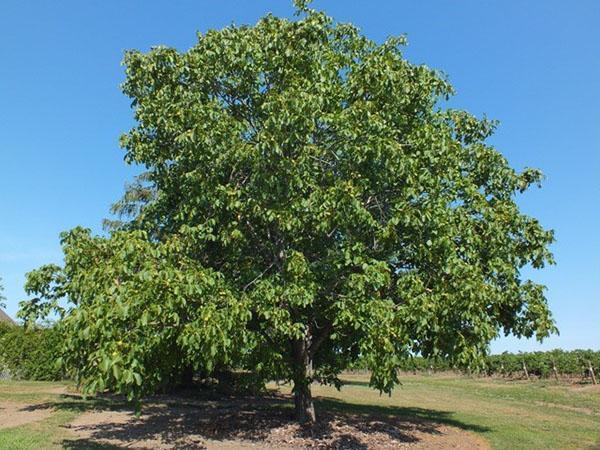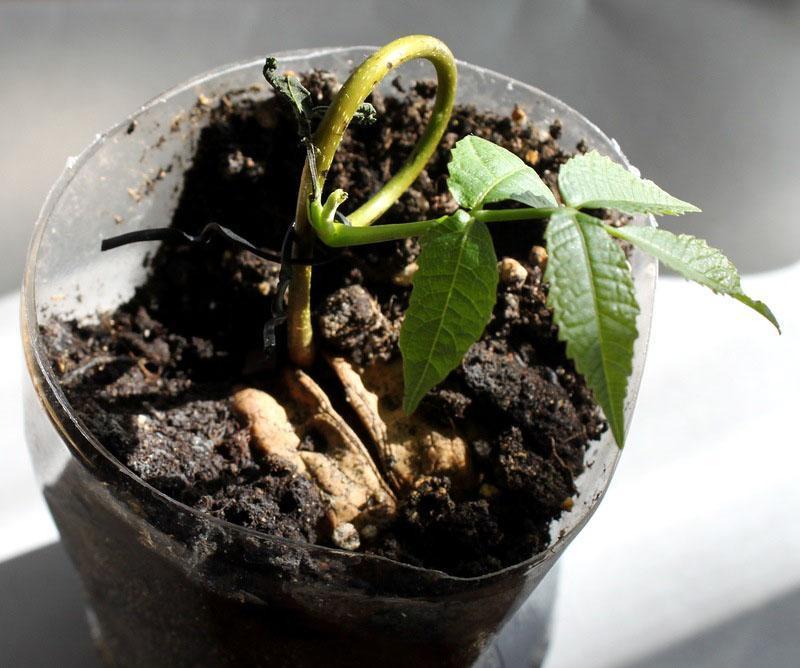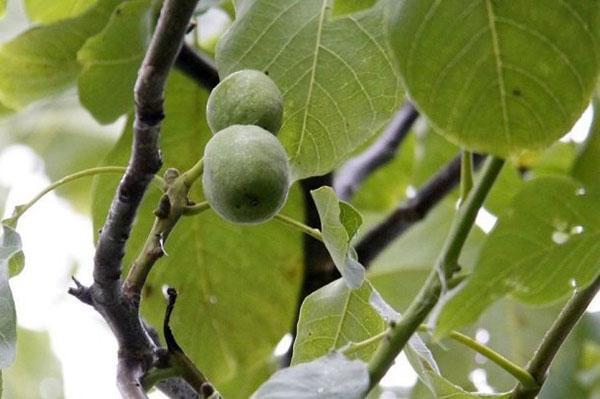Planting and growing walnuts in the country is not at all difficult
 This noble and popular tree many gardeners would like to have on their plots. The problem is that not everyone knows how to plant a walnut in order to harvest it for many years. If you understand the features of this procedure, it becomes clear that this is not such an overwhelming task.
This noble and popular tree many gardeners would like to have on their plots. The problem is that not everyone knows how to plant a walnut in order to harvest it for many years. If you understand the features of this procedure, it becomes clear that this is not such an overwhelming task.
The main methods of breeding

To find out how to plant a walnut correctly, you should familiarize yourself with the main methods of its reproduction. You can spread this culture:
- seeds;
- seedlings;
- in a vegetative way.
When planting a seedling, it is quite difficult to foresee what fruits it will bring in the future, and whether they will be obtained. Therefore, cultivation from seeds is preferable, while about 80% of varietal traits are guaranteed to be transferred. You should select nuts for planting from those trees that grow in your area.
If the mother plant is chosen correctly, growing the walnut vegetatively also ensures that the traits of the resulting offspring and the mother tree are identical. An effective method of such reproduction is considered to be budding in the open field.
Growing walnuts from seeds
 Planting walnuts using seeds is considered one of the easiest breeding methods. This procedure can be carried out not only in spring, but also in autumn.
Planting walnuts using seeds is considered one of the easiest breeding methods. This procedure can be carried out not only in spring, but also in autumn.
The fruits intended for planting must be large and ripe. They are usually green with a slight yellowish tinge and a moderately hard shell.
Nuts intended for planting are best harvested in the fall, when the tree is actively bearing fruit and sheds ripe fruits on its own. A reliable symptom of the ripeness of nuts is a crack in the pericarp or its lagging behind the shell.
How to plant a walnut from seeds? First of all, the selected seeds should be soaked in warm water for 2-3 days, after which they are stratified for 2 months. To do this, they are placed in wet sawdust or sand kept at a temperature of 2-5 degrees. At the end of the stratification period, the seeds are brought into a warm room, where they are germinated. For this purpose, they are placed in containers filled with peat or wet river sand, and kept at a temperature of 5-7 degrees.
Observations show that seeds cleared of pericarp are distinguished by the best germination.
Autumn planting is carried out at the end of October, if climatic conditions permit, the seeds are placed in open ground. Practice shows that with autumn planting it is possible to get more viable seedlings. Walnut planting in spring is in early May.
 The seeds will be immediately planted in a permanent place of growth, so it must be thought out in advance. This area should be protected from the wind and well lit. The depth of placement of seeds is 15-20 cm, they are placed in the hole with the seam up.
The seeds will be immediately planted in a permanent place of growth, so it must be thought out in advance. This area should be protected from the wind and well lit. The depth of placement of seeds is 15-20 cm, they are placed in the hole with the seam up.
Planting walnut seedlings
 Efficient tree cultivation with the help of seedlings is achieved thanks to the observance of all the intricacies of technology.In addition, for the successful growth of a walnut, the presence of such factors will be required:
Efficient tree cultivation with the help of seedlings is achieved thanks to the observance of all the intricacies of technology.In addition, for the successful growth of a walnut, the presence of such factors will be required:
- good soil;
- sufficient illumination;
- the required amount of moisture;
- warmly.
 Usually the planting pit has a size of 70x70 cm, but if this is not enough for the root system, it is enlarged so that the roots of the future tree fit in a straightened state. In equal parts, the pit is filled with earth and humus.
Usually the planting pit has a size of 70x70 cm, but if this is not enough for the root system, it is enlarged so that the roots of the future tree fit in a straightened state. In equal parts, the pit is filled with earth and humus.
For planting, seedlings with a trunk thickness of at least 1 cm are selected, their height does not really matter.

How to plant walnut seedlings correctly? It is recommended to pre-treat their root system with growth stimulants. Then the roots are straightened, placed in a hole and covered with earth, which is then slightly tamped.
The root collar of the seedling during planting should be placed at soil level.
After the end of the procedure, future trees are watered with water, while for each seedling at least 3 buckets of water are required. Trunk areas are mulched with leaves or sawdust.
Vegetative breeding method
 Propagation by cuttings is also favored by many gardeners. A vegetative method is used to improve the properties of the existing variety.
Propagation by cuttings is also favored by many gardeners. A vegetative method is used to improve the properties of the existing variety.
Cuttings required for grafting are cut from the shoots of this year, which are on the southern side of the trunk at a height of at least 5 m. Before cutting, the tree must be well watered and the soil underneath must be dug up.
With the help of a sharp knife, several sharp cuts are made around the handle, and then they are removed together with a shield measuring 3x2 cm, in the middle of which there should be a peephole.
To preserve moisture, the place of future grafting should be wrapped with foil. After 2 weeks, the flap with the bud is simply cut into the bark of the new tree and fixed with electrical tape. They remove it after 3 weeks, during which time the shield and the stock have time to grow together.
Growing and care
 In different climatic regions, the appropriate varieties of seedlings are selected that have the desired properties. For example, growing walnuts in the Moscow region requires varieties such as Sadko, Ideal, Moscow region, which can easily tolerate low temperatures and do not need shelter for the winter.
In different climatic regions, the appropriate varieties of seedlings are selected that have the desired properties. For example, growing walnuts in the Moscow region requires varieties such as Sadko, Ideal, Moscow region, which can easily tolerate low temperatures and do not need shelter for the winter.
Although some Belarusian gardeners consider the cultivation of walnuts on the territory of this country a useless occupation, their compatriots successfully practice planting such varieties here as:
- memory of Minov;
- Samokhvalovichsky;
- Pinsky.
 The successful cultivation of walnuts in Belarus is based on the correct selection of suitable varieties that can withstand the peculiarities of the climate. This example suggests that this tree is capable of growing on almost any soil, but they must necessarily be loose, drained and fertile.
The successful cultivation of walnuts in Belarus is based on the correct selection of suitable varieties that can withstand the peculiarities of the climate. This example suggests that this tree is capable of growing on almost any soil, but they must necessarily be loose, drained and fertile.
No matter how the plant is planted, it grows slowly. Growing walnuts takes care and patience. The tree needs constant feeding, pruning of branches, and in extreme heat it needs abundant watering.